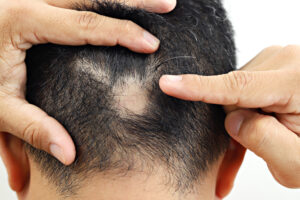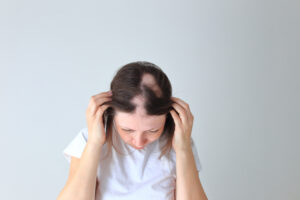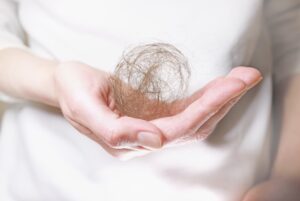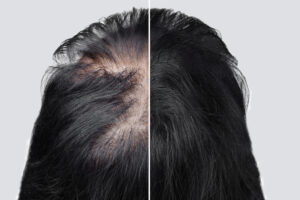
Hair loss is a common condition for many Americans, from those in Seattle, WA to Fayetteville, GA. Alopecia treatment is reserved for those with this common autoimmune disorder, distinct from traditional pattern baldness. But what is alopecia, exactly?
Alopecia is a medical condition that results in hair loss. It can affect any part of the body, but it most commonly affects the scalp. There are several different kinds of alopecia, and each one has its own set of causes and treatments. If you are experiencing hair loss, it is important to consult with a dermatologist today to determine the cause and find the best treatment for you. In this article, we will discuss everything you need to know about alopecia–including what causes the condition and how to treat it!
What Is Alopecia?
Alopecia is an autoimmune condition in which a patient’s hair will fall out, often in clumps at a time. The amount of hair loss varies from individual to individual, and depends on the type of alopecia with which the patient is diagnosed.
What Alopecia Looks Like
Alopecia presents differently than pattern baldness, for example. While hair thinning can occur gradually as a result of genetics, patients with alopecia will lose clumps of hair, often leading to bald patches on the body. This is most commonly found on the scalp, referred to as alopecia areata—but there are several other types of alopecia as well, listed in the section below.

What Are the Different Kinds of Alopecia?
There are five primary kinds of alopecia other than the spotted scalp baldness indicative of alopecia areata, which is the most common form of the disorder. The other types of alopecia include:
- Ophiasis alopecia areata, which causes hair loss around the back and sides of your head in a horseshoe shape
- Diffuse alopecia areata, which presents in the form of rapid hair thinning rather than losing patches of hair at a time
- Alopecia areata totalis, in which the patient becomes completely bald
- Alopecia areata universalis, which is the loss of all body hair
- Androgenetic alopecia, which is distinguished by the gradual thinning of hair on the scalp after puberty due to a disproportionate response to androgens
Will Alopecia Grow Back?
In some cases, alopecia will grow back—but with some individuals, it does not grow back. However, there are treatment options available for those struggling with any form of alopecia, including hair transplantation—though early detection and subsequent care is the best cure.
Which Alopecia Is Permanent?
Cicatricial alopecia causes scarring and inflammation of the hair follicles, which can be uncomfortable for patients, causing pain, burning sensations, and itching. Because the hair follicles are damaged by this type of alopecia, the hair cannot grow back.
Why Alopecia Happens
Alopecia occurs when the body mistakes hair follicles as pathogenic and the immune system attacks them. This lifelong condition causing hair loss is genetic and can be passed down from either parent. About 2.5 million Americans experience alopecia areata.
However, the occurrence of this condition relies on specific interactions between no less than 17 different genes rather than a single gene mutation—so the odds of ending up with the autoimmune disorder are slightly lower than other, simpler genetic mutations. This type of condition is called a “complex polygenic” disorder by geneticists.
How Alopecia Starts
While patients with the autoimmune disorder are born with the fixed genetics that will determine the hair loss patterns, alopecia areata tends to affect patients in waves—particularly in the beginning. Some people associate alopecia with a stress response, believing that it can be a trigger for bouts of hair loss—however, there is yet no hard evidence to support this.

Can Alopecia Be Cured?
Alopecia is a genetic condition without a known cure. However, there are several different types of treatment options available, and the conversation around alopecia and its treatment is ongoing in the scientific community. This suggests that if we don’t find a way to reverse alopecia today, we may at some point in the future. And even without a “cure,” if detected early, as much as 80% of patients find that their hair will grow back with treatment.
What Is the Treatment for Alopecia?
There are several different treatments for alopecia that a qualified dermatologist might prescribe. One such popular treatment is the application of corticosteroids. This is a type of anti-inflammatory drug that are typically injected into the affected area (most commonly the scalp) which reduces the likelihood of the immune system attacking the hair follicles and causing them to scare. This can also come in the form of a pill or topical gel, foam, or cream—though it usually takes a while to see results.
Another approach a dermatologist might take is topical immunotherapy. This type of treatment is typically recommended for patients who experience alopecia in cycles or with widespread hair loss. During this type of treatment, chemicals are topically applied to the affected area to incite an allergic reaction; this will cause a rash to break out and will need to be repeated multiple times, but it does cause the hair to eventually grow back.
Yet another way to treat alopecia is through drugs prescribed for pattern baldness, such as Rogaine. However, alopecia patients typically see mixed results with this type of treatment, as certain types of alopecia are more likely to respond to this drug than others.
However, studies are being done on new approaches to treating alopecia. These methods involve targeting the JAK/STAT pathway, which is commonly inflamed in alopecia patients. Studies are currently underway in which alopecia patients are administered JAK inhibitors, which are already being used by people experiencing myelofibrosis and rheumatoid arthritis as well. There is yet further research needed on the side effects and efficacy of these JAK inhibitors to treat alopecia patients—so for now, most doctors stick with topical immunotherapy or corticosteroids.
Are Alopecia and Psoriasis Related?
Oftentimes, alopecia and psoriasis are comorbid conditions and can affect the scalp or other areas of the body. While most people find that psoriatic alopecia hair loss will grow back, in some rare instances, hair follicle scarring occurs. For more information on psoriasis and its treatment, check out our recent article on the topic!
Fayetteville, GA Alopecia Treatment
Alopecia areata is the most common autoimmune disease, affecting nearly 2% of the population. Alopecia can be a frustrating and embarrassing experience for some patients, but the conversation about alopecia treatment is yet ongoing. While there are many people today who resort to covering up their scalps using scarves, wigs, or hats, there is hope yet for a better way to treat the condition in the years to come.
Are you looking for Fayetteville, GA alopecia treatment specialists? Contact the professional dermatologists at National HealthCare Center today!


